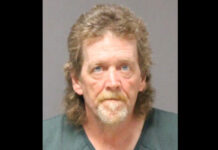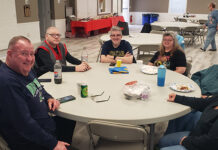
TOMS RIVER, NJ – Veteran actor, writer and stand-up comedian Paul Reiser will perform at the Jay and Linda Grunin Center for the Arts at Ocean County College on Saturday, October 8 at 8 p.m., with singer-songwriter Vance Gilbert opening the evening. Tickets are $55-35.
One of the most prolific actors, comedians, and television writers currently working in Hollywood, Reiser has received multiple Emmy, Golden Globe, American Comedy Award and Screen Actors Guild nominations, and was named one of Comedy Central’s “Top 100 Comedians of All Time.”
Throughout his career, he has starred in numerous hit TV shows, including Stranger Things, The Kominsky Method, and the iconic ’90s sitcom Mad About You, which he co-created with Helen Hunt. Reiser has worked with both independent and mainstream filmmakers, garnering praise for performances in such films as Diner, Aliens, and Beverly Hills Cop as well as the Academy Award-winning Whiplash, John McDonagh’s War on Everyone and Jeff Baena’s Horse Girl, which premiered at Sundance in 2020.
His first book, Couplehood, sold over two million copies and reached the number one spot on The New York Times best-sellers list. His subsequent books, Babyhood and Familyhood, were also best sellers.
A New York City native, Reiser graduated from SUNY Binghamton’s prestigious music program before finding his calling as a comedian performing in New York clubs. He still regularly performs stand-up at sold-out venues nationwide.
Reiser’s special guest, Vance Gilbert, exploded onto the folk and acoustic music scene in the early ’90s, building his reputation through compelling, funny and provocative live performances that defy stereotypes. Gilbert has shared the stage with Aretha Franklin, Arlo Guthrie, Anita Baker and George Carlin, and has performed at some of the world’s most prestigious gatherings.
To purchase tickets, contact the Grunin Center box office at 732-255-0500 or visit grunincenter.org.

This interview was contributed to Jersey Shore Online by Beach Haven West’s John Poveromo, a nationally touring comedian, cartoonist, writer and actor, and the host of “Dystopia Tonight with John Poveromo” on TwitchTV, ApplePodcasts, Spotify and YouTube. Poveromo has been seen on “Gotham Live,” written for Newsweek, and has a short film on Amazon Prime titled “Duppet.”
JOHN POVEROMO: I love that you’re out on the road again doing stand-up with “The Big Font Tour.” It’s got to be exciting to get back to it, especially with all the success you’ve had with shows like “Stranger Things,” “The Boys,” and now “Reboot” on Hulu.
PAUL REISER: It’s been such a busy and interesting time for me. You know “Stranger Things” is a crazy hit, “The Boys” is a huge hit, “Kominsky Method” was a smaller but specific hit, and “Reboot” seems to be a bit of a hit now, but by and large a lot of people don’t know me as a comic. No one’s looking at the doctor from “Stranger Things” and going, “That guy’s funny!” So I’ve heard comments passed on to me from people who were kind of skeptical going, “Oh, gee, the doctor from ‘Stranger Things’ is gonna try stand-up?” And they’ll say, “No, no, no, this is what he does. Stand-up is where he started.” But I get it, so there’s some people who will come to the show now as more of a curiosity, like, “Gee, I like ‘Stranger Things,’ and he’s in my town, so I’ll go!”
JOHN: All the new fans mixed in with traditional comedy fans must be a blast.
PAUL: There are people that surprise me, and it’s flattering. They’ll remember a bit I did in ’83 and I’ll go, “Wow, I forgot about that one, that was funny.”
JOHN: When I was in high school I picked up a book by Franklyn Ajaye called Comic Insights, and in your chapter you said something that stuck with me throughout my career. When describing your style on stage you said, “I allow myself the freedom.” I’m curious now, having recently gone back to stand-up after a 20-year absence, with all the success you have, do you still allow yourself the freedom?
PAUL: That’s just the nature of the beast. It’s got nothing to do with where you’re at in your career. I think stand-up is about discovery. It’s one of the things that makes it so fun, and challenging. It’s a moving goalpost. If you have a new bit, God willing, what’s exciting is literally rearranging your material. It’s like moving paintings around in your house, like “Look at it over there. That’s a totally different thing!” Or like trying different ingredients in a recipe. And it could be subtle in a way that only the performer would know, by losing a word on purpose or by accident. Sometimes you go, “Oh, why, why is that not working?” I mean, I have plenty of bits I know that worked differently a month ago and for the life of me I can’t figure out why, but that’s part of what’s fun about it to me.
JOHN: Did you find anything in stand-up that had changed after you came back to it?
PAUL: There’s no app that makes you funnier, faster. What struck me in a very positive way was how exactly the same it was. The fact that it hadn’t changed was so comforting to me. Because there’s nothing else, that I can think of, that you can do in your 60s that feels like you did when you were 20. The material may change, or you’ve changed, and the format (in which) it can get sent out to the world has changed, but stand-up is so old-school, and so low-tech, there’s nothing you can do to accelerate the process. You just have to do it.
JOHN: Was the plan always to do stand-up for a while and then get an acting gig and leave it behind?
PAUL: No, my plan was to always be a stand-up. When I was in high school, much like yourself, I started listening to comedians like Robert Klein and George Carlin. They were my templates. And then when I started going into the clubs and sort of committing myself to that, in college or after college, that was the extent of my plan, such as it was: “I wanna be a comedian, and I wanna be those guys that get on a plane to some town and tell jokes and go home.”
Acting and TV and movies wasn’t really on my radar, I guess. I knew that sometimes that happens, and you may luck out and you’ll get something like that, but my goal was not to be an actor, so when things progressed as they did, and I got really, really busy in ’92 with “Mad About You,” by necessity I just stopped doing (stand-up).
And then when the show was over, I kind of needed a break to just be home. We had a new baby, we bought a new house, and I was really, really happy to just stay home and catch my breath and live a little differently. But still in the back of my mind, “I’m gonna get back and do it,” and year after year, day by day, you just don’t. And you go, “I guess I didn’t go back, did I?”
JOHN: When you were doing “Mad About You,” was there a lot of overlap between the show and your stand-up?
PAUL: On “Mad About You,” people would say, “Oh man, it so reminds me of my wife. You nailed it. That sounds like us. It sounds like the conversations in my house.” And that totally came out of my stand-up. I wrote that show when I was just newly married, and I was just doing that material and that was the goal. It’s not a big concept show, and that was the success of it. So it’s very validating and reaffirming for me when they’re laughing, because, I can only tell you what happened and then make it funny. I always say I’m not smart enough to make anything up. So when they’re laughing, it’s because they’re actually thinking, “Oh it’s not just me! This idiot’s going through the same thing.”
JOHN: Do you remember what it was that brought you back to it?
PAUL: It’s like so many things in life. I kept waiting for the right moment, but there is no right moment. I remember thinking, “When will I know to move to California?” I go, “Well, just do it!” Well, you know, “I love this woman, when is the right time for us to get married?” It’s not gonna come. You don’t get a notification. You just do it.
What pushed me back into it was one time I emceed some charity event that must have been honoring a friend of mine or something around 2010. And it was just a really fun night and people were drinking and, and I was loose and, and I just went up. I was doing a few minutes bringing up somebody and I just went, “Oh my God, that’s fun!” I had forgotten. It’s like jumping in the ocean going, “Oh, this is great! Why do I not do this more?”
JOHN: Speaking of jumping in the ocean, do you have any particular memories of the Jersey Shore?
PAUL: My father was a health food wholesaler, and his business was in Bergen County, and there was a store in Toms River that he sold to. That was the first time I had ever heard of Toms River, and I remember thinking, sounds like a guy who owns a river more than a city. But I’ve been back a lot, and Jersey always felt, like, good, it always felt comfortable, like I was coming back to visit family and friends.
JOHN: On top of being a comedian and an actor, you’re also a successful author. I was a big fan of your first book Couplehood. Any more books in the works?
PAUL: I followed Couplehood up with the Babyhood and Familyhood, and then after those I guess the next step is Strokehood. I’d have to write that one right before the stroke, so nothing is in the works yet.
JOHN: I absolutely loved your film “The Thing About My Folks.” It’s extremely cathartic in the way it peels back the relationship between parents and their children to the point where, if you haven’t already, you start seeing them as human beings who just tried to do their best. In one scene, Peter Falk’s character says, “This. This is all I ever wanted. To lie down.” Earlier you had mentioned after “Mad About You” ended you wanted to stay home, catch your breath and live a little differently. Is that where it came from?
PAUL: My father was a successful businessman, and to me everything seemed like a distraction to him. “I gotta get up, I gotta fix this, I gotta take care of the kids doing this, address this with my wife … if I could just sit down …,” and that struck me as true and funny. And the idea became a running joke with Helen Hunt, who is a brilliant actress. So one of the templates of acting is in every scene you have to have an intention. What is it you want? I want to seduce the other character or punish or whatever. And one day, jokingly I said, “You know, I just wanna sit down.” She was always moving, she was cooking, she was cleaning, and I go, “I’m just gonna sit down. It’s not that I’m lazy, it’s just something seems to interfere. And if I could sit and really not be bothered for a half-hour, I might be over it.”
JOHN: I’ve asked every guest on my show this next question, and I’m excited to ask you: If you could go back in time and give yourself one piece of advice that would help you today, what would it be?
PAUL: Worry less, and the stress will be worth it. I went through a lot of stress at 22, 23, 24. And for me, that was leaving my dad’s business, which he had kind of presumed I would take over. It was a very successful business that started very small and took him years to build and was his life’s work. And I was struggling with “Yeah, I know, but I wanna be a comedian.”
He came from an age where show business and boxing were what you did if you had to get out of the ghetto. I remember very vividly at 23 having this heart-to-heart where I had decided clearly that I knew what I wanted to do, and I wanted to do stand-up. I explained I was approaching stand-up the same way he approached his business. But I remember, had I not gone through that stress, I don’t know that I would’ve gone through the work of clarifying for myself so deeply what it is I loved to do.







